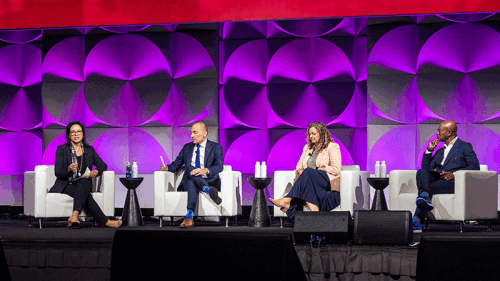What consumers want is to “live large and carry little,” said generational marketing expert J. Walker Smith, executive chairman of the Futures Company, in a 2016 ULI Spring Meeting session moderated by ULI Global CEO Patrick L. Phillips.
Consumers are not limiting their lifestyles or downsizing their dreams, but they want to live in a different way, “without all the heavy baggage they’ve carried around,” Smith said. They do not want the mental or physical weight of dealing with stuff they buy, need space for, and have to maintain and store. Living large but carrying little “relates directly to consumer ownership, not spending,” he explained. “People want to spend, but the question is: Do they want to spend to own?
“Digital technology, social connectedness, and living arrangements that we see people adopting” are fundamentally changing how people want to participate in the marketplace, he said. The biggest factor is digital technology, which is “shaping people’s engagement with one another, so it has a direct impact with social connectedness and, in turn, living arrangements.”
Smith said that most people do not realize how much digital technology has already transformed how people live their lives. He illustrated his point with two photos of crowds at St. Peter’s in Rome awaiting the selection of a new pope; in 2005, one person in the crowd held up a flip phone to take a picture; in 2013, the entire crowd held up smartphones or iPads to capture the moment. “It was a very different kind of crowd, as a result of digital technology.
“We’re so tied to smart handheld devices that we can’t envision living our lives without them,” he said. Digital technologies possess extraordinary power, especially considering the first smartphone was introduced less than a decade ago. By 2020, Smith predicted, 6 billion smartphones will be in use, and “for the first time in history, every person on the planet will have the same technology.
“Smartphones are the key factor in how people are making decisions,” he said. They may decide they need a smartphone more than a car because the smartphone allows them to call for a car and buy virtually anything they want and have it delivered. Devotion to digital devices borders on obsession: Half of all baby boomers sleep with their cellphones, but among millennials, it is 83 percent. Three out of four consumers cannot go a day without their smartphone, and 45 percent can’t go longer than several hours, with some spending a good portion of every day “working on their cloud scores” on social media.
How people think about technology also is transforming the aspirational context for what consumers want out of their lifestyle, Smith said. He compared changes in average household spending from 2006 through 2013: People now spend more on health care, rent, education, telephone services (including smart devices, a lifestyle necessity), and food at home; and less on food away from home, vehicle purchases, entertainment tickets, furniture, apparel, and mortgages.
Digital technology has led to a “shuffling of first priorities,” he said, as well as greater ability to rent or share homes, easy access to free or cheaper stuff, and the ability to get everything on demand. In 2013, only 11 percent of survey respondents said that having a large, expensive home indicated success and accomplishment, compared with 25 percent in 1995; 15- to 24-year-olds are less likely to have a driver’s license than a generation ago; and renting or sharing homes has increased significantly. Digital technology has inspired a rethinking of how much storage, parking, utility, bonus, and workspace people need, he said.
This new mind-set about materialism is veering away from owning things and toward a “kinship economy,” with relationships having the highest value, a trend reflected in social networks, dating sites, mobile sharing, and the sharing economy for transportation and housing. In the kinship economy, “brands have to be in the job of fostering social currency,” Smith said. The growth of dense and diverse center cities, or “centers of consumption,” reflects people’s attraction to being in active and social places such as the Atlanta Beltway, New York’s Highline, and parks, farmers markets, festivals, cafés, and coffee shops. Lively urban places, along with online social networks, fit into the trend of “having more relationships as the central benefit in a marketplace driven by social connections.”
Smith predicted that household structure will change as millennials continue to delay getting married and starting families. Less than half of all U.S. households now contain married parents with children. An even greater percentage of people “will not have the material lifestyle, won’t live in big homes, and may not marry or have kids.” Homeownership is not going away, but millennials, if they move to the suburbs, may want to rent or make different decisions than their parents as household formation gets pushed further out. Millennials are facing a different work world also, he said, predicting that “about half of all jobs today will get displaced by digital technology.” And baby boomers are pushing out the age of retirement five or six years to an average targeted age of 63, meaning they will need housing solutions that allow them to stay in their homes longer and need other options later.
Phillips asked what the sharing society means for buying structure and what that means for consolidation. “There’s always someone in the middle who owns the infrastructure that allows the capacity” and is trying to earn returns, Smith said. “Uber and Airbnb have done it well.” Sharing-economy companies “have to earn people’s trust” and have institutional safeguards in place so that consumers can trust having a paid interaction with another person digitally. Phillips asked Smith about his comfort level in these companies’ transparency. The latter replied that “like anything else, the market will determine. Users will make choices based on transparency and how they’re treated.”

